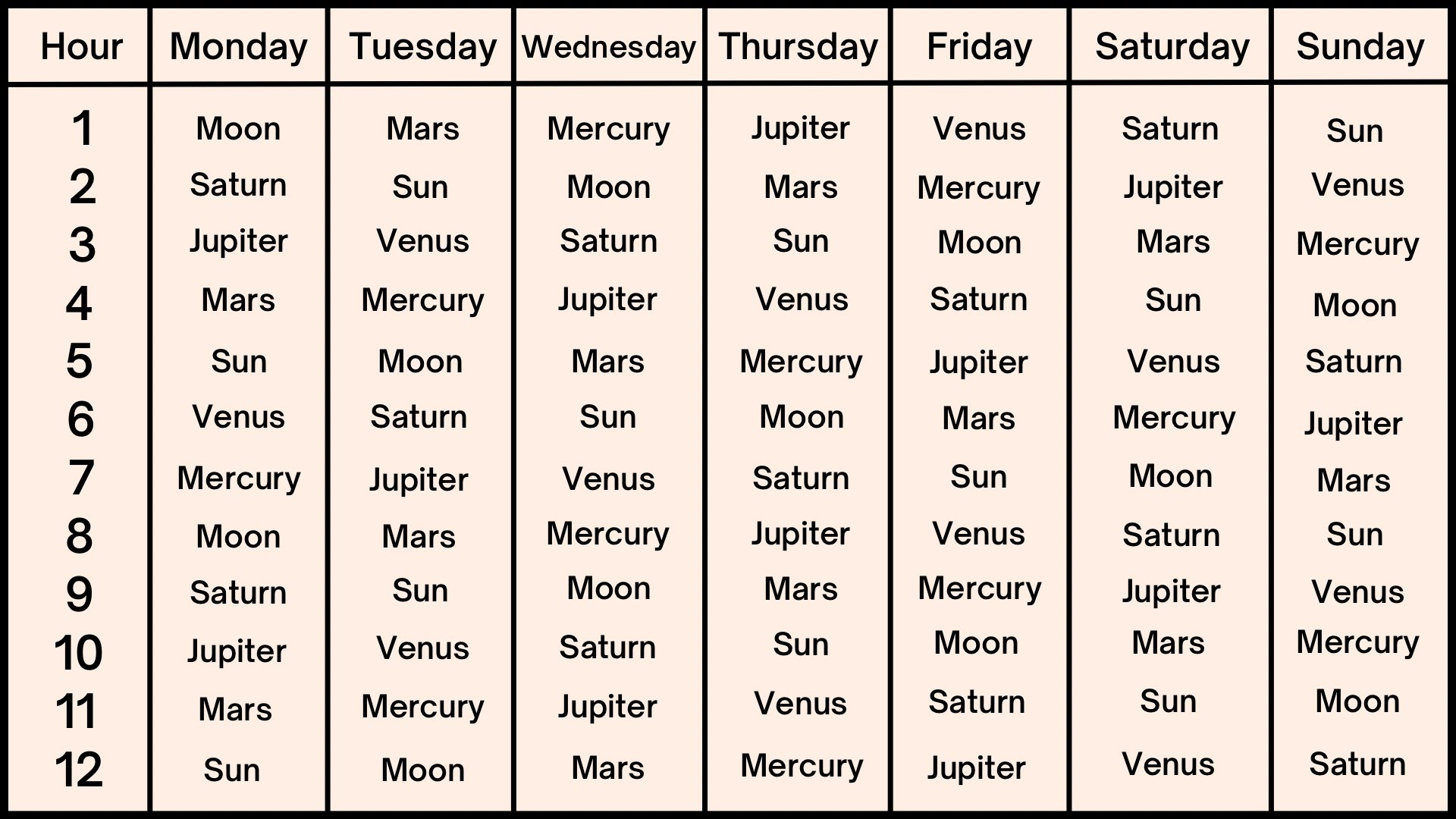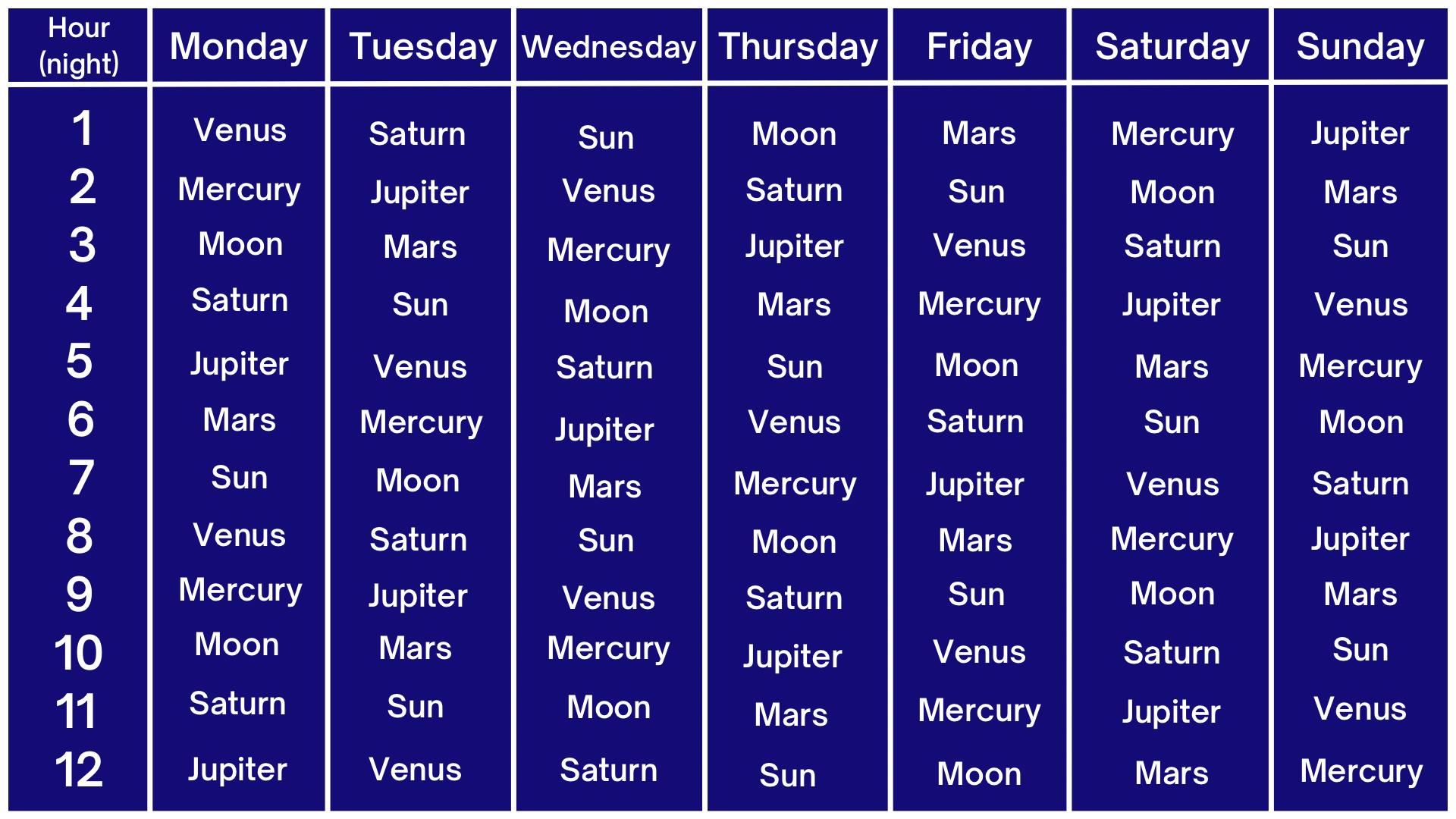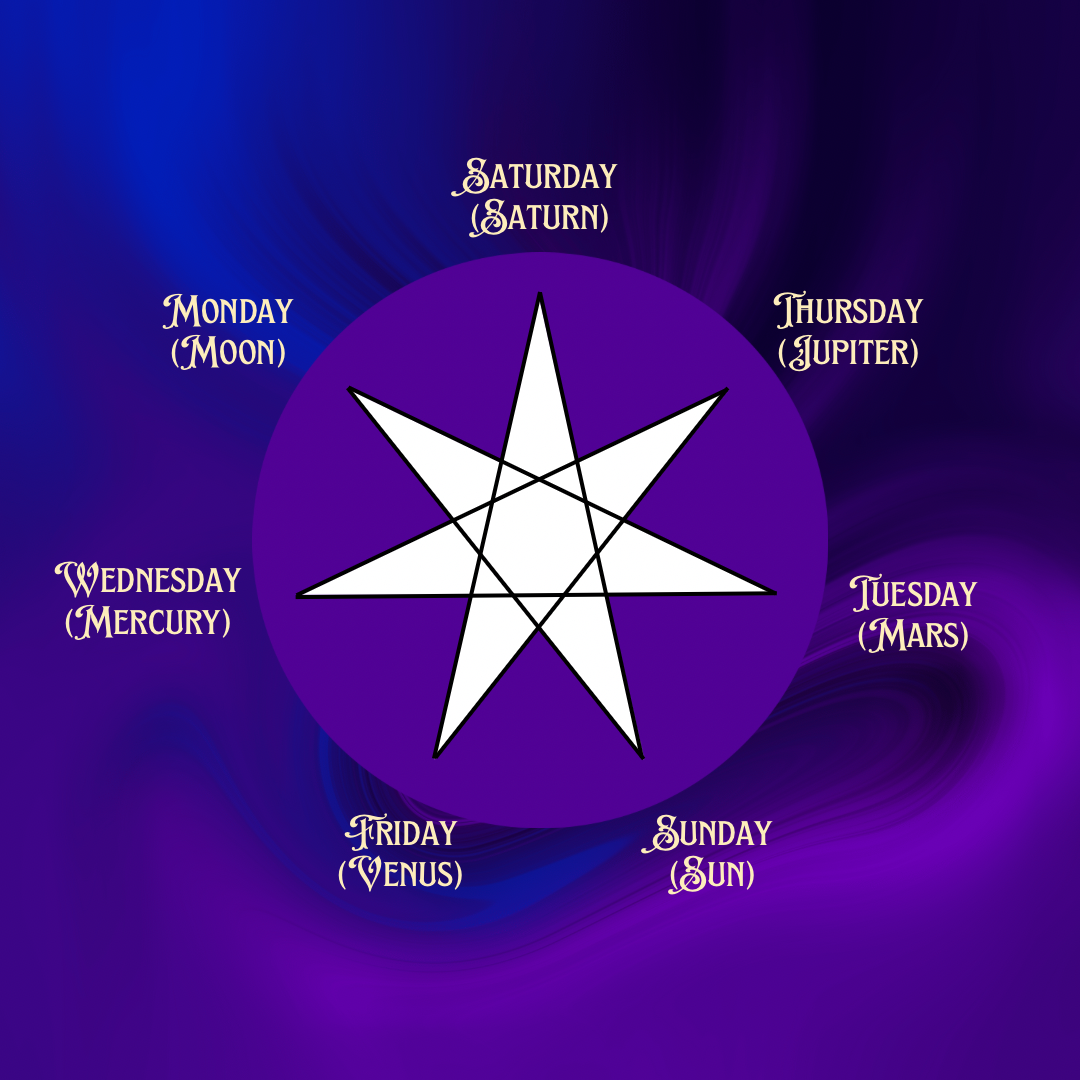Planetary Days & Hours in Astrology
Planetary days & nights have been widely used since the first days of astrology, since at least the Mesopotamians. A planetary day lasts from sunrise to sunset, and a planetary night from sunset to sunrise. Planetary days & hours are the smallest unit within the larger the intimate ties between astronomy, astrology, time-keeping & agriculture. Time was divided into larger eras/cycles (the Jupiter/Saturn bi-centurial conjunction), seasons (the signs’ modalities), months, days and hours.
Since their inception, which is probably as long as astrology & agriculture, planetary days & hours were used for electional & magical purposes. When should you talk to the lord of the land? When should you get married? Sow seeds or buy cattle? All of this follows intricate rules mixed with magic & millenia of folklore. Planetary days & hours were also widely used to make magical objects such as talismans, in order to capture a specific deity or spirit through association with its day or hour. Casting a full chart & doing birth chart interpretation were by far the least common applications of astrology, since it was a long and tedious process that required advanced knowledge only possessed by a few, elite individuals (wise men, scientifics, the ruling class…). Planetary hours, days, seasons and the motion of the Moon, on the other hand, were far more common and accessible. It makes them easy to use to this day, in a more modern context of course!
But how do planetary days work? How are they arranged? That’s what we’re going to discuss now!
Planetary hours: how they work
Planetary hours are arranged in Chaldean order. The first hour of any given day (which begins at sunrise) is always going to be the same as the planetary day. For example, the first hour of Monday (day of the Moon) is always Moon hour. The Chaldean order determines the rest of the sequence, which goes as follows:
Saturn - Jupiter - Mars - Sun - Venus - Mercury - Moon
This means that on Mondays, the first hour after the Sun rises is Moon hour, then Saturn hour, Jupiter hour, Mars hour… Repeat 12 times. There are 12 hours between sunrise and sunset, and 12 hours between sunset and sunrise, which amounts to a full 24-hour day! You can have a look at the pictre below which gives you a complete table of all planetary days, nights and coresponding hours.
The Chaldean order of the planets is based on mean velocity (the average speed) of the 7 traditional planets in descending order. Saturn is the slowest planet of all, taking approximately 29.4 years to complete a full revolution around the zodiac, while the Moon is the fastest, taking 27.3 days. When you go from Saturn to the Moon in the Chaldean order, you go from the slowest planet to the fastest in descending order (Jupiter being the 2nd slowest, Mars the 3rd slowest, etc.).
Note that due to astronomical factors due to the inclination of the Earth, our days do not last exactly 24 hours. As a result, a planetary hour typically doesn’t last exactly 1 hour (60 minutes) — its lenght will depend on your location relative to the equator, so depending on what city/country you’re in, a planetary hour won’t last the same! You can use free softwares or apps to keep track of planetary hours based on your location (I use TimeNomad). You can also calculate by hand, by converting the time between sunrise and sunset to seconds, dividing it by 12, then converting it back to hours and minutes.
Example: on September 1, 2023 in Paris, France, the Sun rose at 7:06AM and set at 8:33PM (20:33). That’s 13 hours and 17 minutes. 13 hours x 60 = 780 minutes, plus 17 minutes = 797 minutes. 797 minutes x 60 = 47,820 seconds. We know divide the number of seconds in the day by 12 to obtain the time of each planetary hour. 47,820/12 = 2,960. A planetary hour for this given day & location = 3985 seconds, /60 thats 66.4 minutes! So we know that for that day, a planetary hour will last a little over 66 minutes (1 hour 6 minutes). September 1, 2023 is a Friday (Venus day), so now I know that from 7:06AM (time of sunrise) to 8:14AM will be Venus hour, then following the Chaldean order 8:14AM to 9:21AM will be Mercury hour, etc.!
As we will see, planetary hours were used to conduct a variety of activities, and were auspicious fo different things. For example, Venus hour is auspicious for Venusian things: going on dates, messaging someone you love, getting your hair cut… For now, let’s talk about planetary days!
Planetary days & nights
The order of planetary days is as follows (refer to the table above):
Monday: Moon day - Tuesday: Mars day - Wednesday: Mercury day - Thursday: Jupiter day - Friday: Venus day - Saturday: Saturn day — Sunday: Sun day
The name of the days in English comes from Teutonic & Germanic influences (as English is part of the family of Germanic languages). Their association with Latin gods is more evident in romance languages, like Italian, Spanish or French (ex: Monday is lundi in French, lundi = lune, Moon in French derived from the Latin luna, Tuesday is mardi, Wednesday is mercredi, Thursday is jeudi…).
Why don’t the days of the week follow the Chaldean order like the planetary hours do?
The planetary days follow a different rationale. Instead, if we organise the 7 traditional planets in Chaldean order, but in a circle, by tracing a line from one day/planet to the other, we create a heptagram (star with 7 branches), which has significant astrological and magical symbolism and applications (see diagram below). Now you know what the planetary days are and where they come from!
What about planetary nights?
The order of planetary nights is as follows (refer to the table above):
Monday: Venus night - Tuesday: Saturn night - Wednesday: Sun night - Thursday: Moon night - Friday: Mars night - Saturday: Mercury night - Sunday: Jupiter night
The rationale behind planetary nights may seem confusing, but it’s pretty simple. Remember how we said that a planetary day (after sunset) always starts with the same planetary hour? (Monday = Moon hour, Tuesday = Mars hour, etc.). Planetary nights always start with the corresponding hour too — they are determined by them! Let’s use an example: Friday (Venus day), like every other planetary day, begins at sunrise and ends at sunset and has 12 planetary hours. As we said, it starts with Venus hour, so the next 11 hours will be (following the Chaldean order): Mercury hour (planetary hour #2), Moon hour (#3), Saturn hour (#4), Jupiter hour (#5), Mars hour (#6), Sun hour (#5), Venus hour (#6), Mercury hour (#7), Moon hour (#8), Saturn hour (#9), Jupiter hour (#10), Mars hour (#11) and finally Sun hour (#12).
What happens after sunset? The planetary hours simply continue until the next day! So hour (#13), or the #1 hour of night is… Mars hour! This is why Friday night is Mars night! You can see this and count yourself with the planetary days & hours table above. Pretty straightforward when you think about it!
Daily (and magical) applications of the planetary days & hours
You can use planetary days & nights to do things associated with the planet. They are convenient measures of time, as sometimes doing a simple activity (texting your boss, asking for a favour, seeing your crush…) doesn’t require a full blown electional chart. You can use a planetary hour for day-to-day activities, or on the contrary to avoid doing certain things (for example, texting someone to cancel plans during Mars hour might irritate them, whereas waiting until Venus or Moon hour is a better idea). Keep in mind that a planetary hour is reinforced on its corresponding planetary day (ex: Thursday (Jupiter day)/Jupiter hour). Here’s some activities and things to do or avoid for each planetary day and hour:
Monday & Thursday night (Moon): good for spending time with your mum, have a relaxing day, acting as a messenger between people. It’s also good for travel, to cook something, to eat a good meal.
Tuesday & Friday night (Mars): Be cautious! Unless you have to fight with someone, Mars days & nights aren’t usually super auspicious (unless you’re dealing with Mars people, like soldiers/vets or butchers!). They’re good for competition and victory, if you want to win an argument or to “stand your ground”.
Wednesday & Saturday night (Mercury): are excellent for communication of any kind, if you have something important to say (like a speech), for any kind of business deal or conversation, to put something on sale, to write something, to play a game or enter a competition.
Thursday & Sunday night (Jupiter): great for matters of law (dealing with lawyers/judges, etc.), religious matters (praying, setting up an altar…), travel, and speaking/obtaining favours from people of a higher "rank"/officials. It’s good for meditation and philosophy, as well as to temper and appease a situation.
Friday & Monday night (Venus): Great for romantic affairs & pleasurable things, getting pampered/beauty treatments, marriage. You can go on a date, get your hair or nails done… These days are also good for cleaning your house, and for metting new people.
Saturday & Tuesday night (Saturn): Malefic, same as for Mars. Really inauspicious. Be cautious & only use for things you REALLY can’t be arsed to do (and still… it might slow you down). However, they’re good to spend time with older people or to ask something from them.
Sunday & Wednesday night (Sun): doing public things, talking to important people, undertaking activities where you are "seen" (taking an improv class, for example). Buying luxury goods as well. They are generally good for activities that bring confidence and visibility.
Using planetary days and hours in the context of planetary remediation (the art of using symbolic astrological remedies to mitigate a difficult placement causing issues) is very effective! For example, planetary charity (giving your money, time, etc. to a cause representing a planet) is very effective in that context. I recommend donating to a charity of war victims on Tuesdays if Mars is afflicted in your chart/to a homeless shelter on Saturdays for Saturn (that’s a general one, planetary remediation woks better on a case by case basis). To maximise the potency of a planetary day/night, you can do an associated activity on that day AND on its hour. Ex: going on a date on the first hour of Monday night (Venus night) Which is Venus hour, works great!
I hope you found this article on the role of planetary days & hours helpful and illuminating ✨ if you’re interested in planetary remediation, I offer talismanic products to remedy certain placements (Venus for love, Sun for confidence/wealth…) (click on the button below). You can also book a planetary remediation consultation to discuss a personalised regimen of remediation and activities during certain planetary days & hours!



